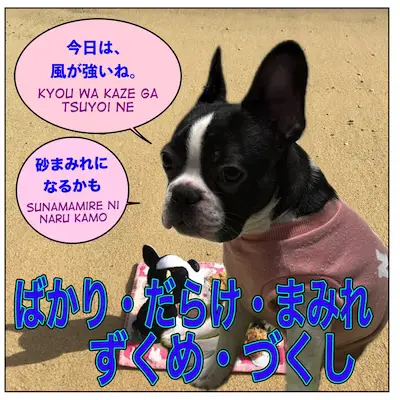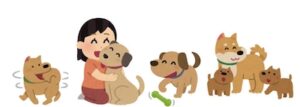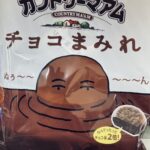
「今日は、風が強いね。」
= きょうは、かぜがつよいね。
= Kyou wa, kaze ga tsuyoi ne.
= It’s very windy today.
「砂まみれになるかも」
= すなまみれになるかも
= Sunamamire ni naru kamo.
= I might get covered with sand.
Hi everyone! I am your guest teacher, Boss.
Today, we are going to study how to use noun + ばかり / だらけ / まみれ / ずくめ / づくし = bakari / darake / mamire / zukume / zukushi.
Target JLPT Levels :
* ばかり = bakari → JLPT N4
* だらけ = darake →JLPT N3
* まみれ = mamire →JLPT N1
* ずくめ = zukume →JLPT N1
* づくし = zukushi →JLPT N1
As you can see, the target levels are different, but I think it will be useful to study them all together in this lesson.
⭐️How to form
→noun + ばかり / だらけ / まみれ / ずくめ / づくし = bakari / darake / mamire / zukume / zukushi
These expressions are similar and can be translated as “something is everywhere,” “filled with something,” etc. However, they differ in nuance (positive, negative, or neutral), context, and usage.
I will explain the differences and how to use them in this lesson.
⭐️ばかり= bakari : only/ nothing but ~
It can be used in both positive and negative contexts.
🔸noun + ばかり ( = bakari ) + auxiliary verbです/だ = desu/da) :
There is nothing but ~/~ is everywhere
Ex. うちの部署にいるのは大人しい人ばかりだ。
= うちのぶしょにいるのはおとなしいひとばかりだ。
= Uchi no busho ni iru no wa otonashii hito bakari da.
=There are only quiet people in my department.
Ex. 最近は、いやなニュースばかりなのでニュースの時間になるとすぐにテレビを消す。
= さいきんは、いやなニュースばかりなのでニュースのじかんになるとすぐにテレビをけす。
= Saikin wa, iyana nyuusu bakari nano de nyuusu no jikan ni naru to sugu ni terebi wo kesu.
= Recently, there’s nothing but bad news, so when it’s time for the news, I immediately turn off the TV.
Ex. 世の中悪い人ばかりではない
= よのなかわるいひとばかりではない
= Yononaka warui hito bakari dewa nai.
= Not all people in the world are bad.
🔸noun + ばかり ( = bakari) + verb (action): to do nothing but ~ / to repeatedly do something
When you describe repeated actions or a state where only the specified noun is involved.
Ex. この店は猫のものばかり売っている。
= このみせはねこのものばかりうっている。
= Kono mise wa neko no mono bakari utte iru.
= This store only sells cat-related items.
Note: In casual speech/writing, you say ばっか = bakka.
→猫のものばっか = ねこのものばっか = neko no mono bakka
Ex. ビールばかり飲むのは体によくない。
= ビールばかりのむのはからだによくない。
= Biiru bakari nomu no wa karada ni yoku nai.
= Drinking nothing but beer is not good for your health.
Ex. 友達と集まってもみな、スマホばかり見ていてつまらない。
= ともだちとあつまってもみな、スマホばかりみていてつまらない。
= Tomodachi to atsumatte mo mina, sumaho bakari mite ite tsumaranai.
= Even when we gather with friends, everyone just keeps looking at their smartphone, and it’s boring.
Ex. 今日は変な電話ばかりかかってくるなあ
= きょうはへんなでんわばかりかかってくるなあ
= Kyou wa henna denwa bakari kakatte kuru naa.
= Hmm, I keep getting nothing but weird calls today.
Ex. 彼は嘘ばかりついている。
= かれはうそばかりついている。
= Kare wa usobakari tsuite iru.
= He is always lying.
Ex. 祖母は、「昔はよかった。」と同じことばかり話している。
= そぼは、「むかしはよかった。」とおなじことばかりはなしている。
= Sobo wa, “mukashi wa yokatta.” to onaji koto bakari hanashit eiru.
= My grandmother keeps talking about how things were better in the past.
Ex. 小さい頃、この漫画ばかり読んでいたから今でも登場人物は全員言えるよ。
= ちいさいころ、このまんがばかりよんでいたからいまでもとうじょうじんぶつはぜんいんいえるよ。
= Chiisai koro, kono manga bakari yonde ita kara ima demo toujoujinbutsu wa zen’in ieru yo.
= I used to read this manga all the time when I was a child, so I can still name all the characters from that time.
Ex. この街に引っ越してからいいことばかり起きる。
= このまちにひっこしてからいいことばかりおきる。
= Kono machi ni hikkoshite kara ii koto bakari okiru.
= Ever since I moved to this town, nothing but good things have been happening.
📝Note: For the usage verb + ばかり ( = bakari) , check this lesson
⭐️だらけ ( = darake) : Something is covered with ~ /filled with ~ /to be full of ~
When you describe a place, object, or situation that is full of or covered with undesirable things.
It is often used in negative connotations.
Common patterns:
🔸noun + だらけ (= darake) + auxiliary verb です/だ ( = desu/da)
🔸noun +だらけ (= darake) + に ( = ni) + なる ( = naru)
🔸noun + だらけ (= darake) + の ( = no) + noun
Ex. ベッドの下が埃だらけだった。
= ベッドのしたがほこりだらけだった。
= Beddo no shita ga hokori darake datta.
= There was dust everywhere under the bed.
Ex. 日本語で手紙を書いたら間違いだらけだった。
= にほんごでてがみをかいたらまちがいだらけだった。
= Nihongo de tegami wo kaitara machigai darake datta.
= I wrote a letter in Japanese, and it was full of mistakes.
Ex. この車は、傷だらけだから、高く売れないだろう。
= このくるまは、きずだらけだから、たかくうれないだろう。
= Kono kuruma wa, kizudarake dakara, takaku urenai darou.
= This car is covered in scratches, so it probably won’t sell for a high price.
Ex. ケーキを作ったら台所が粉だらけになった。
= ケーキをつくったらだいどころがこなだらけになった。
= Keeki wo tsukuttara daidokoro ga konadarake ni natta.
= After making a cake, the kitchen was covered in flour.
Ex. 部屋がゴミだらけにならないようにいらないものはすぐに捨てよう。
= へやがごみだらけにならないようにいらないものはすぐにすてよう。
= Heya ga gomi darake ni naranai you ni iranai mono wa sugu ni suteyou.
= Let’s throw away things we don’t need right away so the room doesn’t get full of trash.
Ex. 泥だらけの靴で玄関に入らないで。
= どろだらけのくつでげんかんにはいらないで。
= Dorodarake no kutsu de genkan ni hairanai de.
= Don’t come into the entrance with muddy shoes.
Ex. 父は、靴下が穴だらけになっても全然気にしないではいていた。
= ちちは、くつしたがあなだらけになってもぜんぜんきにしないではいていた。
= Chichi wa, kutsushita ga anadarake ni nattemo zenzen kinishitai de haite ita.
= My father didn’t care at all if his socks got full of holes.
Ex. 年を取ってしみだらけにならないように日焼け止めを塗る。
= としをとってしみだらけにならないようにひやけどめをぬる。
= Toshi wo totte shimidarake ni naranai you ni hiyakedome wo nuru.
= I apply sunscreen to avoid getting covered in age spots as I get older.
Ex. 若い頃は、仕事で失敗ばかりしていた。
= わかいころは、しごとでしっぱいばかりしていた。
= Wakai koro wa, shigoto de shippai bakari shite ita.
= When I was young, I used to make nothing but mistakes at work.
Ex. 長く付き合っていると相手の悪いところばかりに目がいってしまう。
= ながくつきあっているとあいてのわるいところばかりにめがいってしまう。
= Nagaku tsukiatte iru to aite no warui tokoro bakari ni me ga itte shimau.
= When you’ve been dating someone for a long time, you start focusing only on your partner’s flaws.
⭐️まみれ ( = mamire) = to be covered with / to be soaked in
It describes something or someone being covered, smeared, stained, or soaked with something that is tangible and unpleasant or dirty (often sticky or hard to remove). It is often used to talk about fine particles.
Common patterns:
🔸noun + まみれ ( = mamire) + auxiliary verb です/だ ( = desu/da)
🔸noun + まみれ ( = mamire) + に ( = ni) + なる ( = naru)
🔸noun + まみれ ( = mamire) + の ( = no) + noun
It is similar to だらけ ( = darake) but まるけ ( = maruke) is more often used to give the nuance of something being more intense or unpleasant.
For example
→泥だらけの靴 = どろだらけのくつ =dorodarake no kutsu
= shoes full of mud or covered with mud.
→泥まみれの靴 = どろまみれのくつ = doromamire no kutsu
= showed soaked or stained with mud,
(It suggests that mud is sticky and harder to clean off.)
Also the nouns that you can use with まみれ ( = mamire) is more limited than だらけ ( = darake)
→泥 = どろ = doro = mud, 血 = ち = chi= blood, 汗 = あせ = ase = sweat
Ex. 犯人は血まみれのシャツを脱ぎ捨てて現場を去った。
= はんにんはちまみれのシャツをぬぎすててげんばをさった。
= Hannin wa chimamire no shatsu wo nugisutete genba wo satta.
= The criminal took off his blood-soaked shirt and left the scene.
Ex. この暑さの中、汗まみれで工事現場で働いています。
= このあつさのなか、あせまみれでこうじげんばではたらいています。
= Kono astsusa no naka, asemamire de koujigenba de hataraite imasu.
= In this heat, I’m working at the construction site, drenched in sweat.
Ex. Boss 先生: ビーチで遊んでいたら砂まみれになった。
= Boss せんせい: ビーチであそんでいたらすなまみれになった。
= Boss Sensei: Biichi de asondeitara sunamamire ni natta.
= I got covered in sand while playing at the beach.
Note: まみれ( = mamire) is usually used in negative connotation but you may see or hear まみれ ( = mamire) used to describe something saturated or filled with something in a humorous way.
For example, you may come across words like 猫まみれ (= ねこまみれ = nekomamire) or 犬まみれ ( = いぬまみれ = inu mamire ), which jokingly describe a place full of cats or dogs.

There’s also a chocolate snack called チョコまみれ ( = choko mamire), which refers to cookies soaked in chocolate.

Also まみれ ( = mamire) is used to describe situations or abstract things.
Ex. 彼は、借金まみれの生活を送っていた。
= かれは、しゃっきんまみれのせいかつをおくっていた。
= Kare wa, shakkin mamire no seikatsu wo okutte ita.
= He was living a life full of debt.
Ex. その週刊誌はうそまみれの記事を掲載している。
= そのしゅうかんしはうそまみれのきじをけいさいしている。
= Sono shuukanshi wa usomamire no kiji wo keisai shiteiru.
= The weekly magazine is publishing articles full of lies.
⭐️ずくめ (尽くめ) ( = zukume): entirely/consisting entirely of ~
It describes a situation or object that is entirely of one kind.
It is also used for abstract qualities.
The words you can use with ずくめ ( = zukume) are very limited.
Common patterns:
🔸noun + ずくめ ( = zukume) + auxiliary verb です/だ ( = desu/da)
🔸noun + ずくめ ( = zukume) + の ( = no) + noun
Ex. 彼は楽しい会なのに黒ずくめの服でやって来て一人浮いていた。
= かれはたのしいかいなのにくろずくめのふくでやってきてひとりういていた。
= Kare wa tanoshii kai nano ni kurozukume no fuku de yatte kite hitori uite ita.
= Even though it was a fun event, he showed up in all black clothes and stood out.

Note: ずくめ ( = zukume) is typically used with black, 黒 (= くろ = kuro)
→ 黒ずくめ= くろずくめ = kurozukume
Ex.
A: 「去年、結婚して今年赤ちゃんが産まれたの。」
= A:きょねん、けっこんしてことしあかちゃんがうまれたの。
= A: Kyonen, kekkon shite kotoshi akachan ga umareta no.
= A: I got married last year, and had a baby this year.
B: 「いいことずくめだね。」
= B: iikoto zukume dane.
= B: Everything’s coming up roses for you!
Ex. 仕事ずくめの生活から解放されて1ヶ月ぐらいどこかに行きたい。
= しごとずくめのせいかつからかいほうされていっかげつぐらいどこかにいきたい。
= Shigoto zukume no seikatsu kara kaihou sarete ikkagetsu gurai dokoka ni ikitai.
= I want to free myself from my work-filled life and go somewhere for about a month.
Ex. 健康でいい家族や友人にも恵まれ幸せずくめの人生だ。
= けんこうでいいかぞくやゆうじんにめぐまれしあわせずくめのじんせいだ。
= Kenkou de ii kazoku ya yuujin nimo
= My life is full of happiness, blessed with good health, a great family, and wonderful friends.
Ex. 異例ずくめの会見が終わった。
= いれいずくめのかいけんがおわった。
= Irei zukume no kaiken ga owatta.
= The press conference, which was full of unprecedented events, has ended.
Ex. 東京オリンピックの女子柔道は記録ずくめだった。
= とうきょうオリンピックのじょしじゅうどうはきろくずくめだった。
= Toukyou orinpikku no joshi juudou wa kiroku zukume datta.
= The women’s judo at the Tokyo Olympics was full of record-breaking achievements.
⭐️づくし = zukushi : full of ~/completely dedicated to ~
This word is used to express an abundance or exclusivity of a single theme.
It is often used with themed meals featuring the same ingredient prepared in various ways (both positive or neutral contexts. )
You will often see「 ~ づくし( = zukushi)」 in menus to describe a dish or buffet that focuses entirely on a particular ingredient.
Common patterns:
🔸 noun + づくし ( = zukushi)
🔸 noun + づくし ( = zukushi) + の ( = no) + Noun
Ex. タコづくし定食 🐙
= タコづくしていしょく
= Takozukushi teishoku
= A set meal featuring various octopus dishes.
Ex. 北陸の旅館では蟹づくしの料理が楽しめた。 🦀
= ほくりくのりょかんではかにづくしのりょうりがたのしめた。
= Hokuriku no ryokan dewa kanizukushi no ryouri ga tanoshimeta.
= We could enjoy a a completely crab filled meal at the ryokan in Hokuriku.
Ex. そのホテルでは苺づくしのスイーツビュッフェをやっている。
= そのホテルではいちごづくしのスイーツビュッフェをやっている。
= The hotel is offering a strawberry-themed dessert buffet.
Ex. 旅館の食事は、伊勢海老や鮑、松坂牛のステーキなど贅沢づくしだった。
= りょかんのしょくじは、いせえびやあわび、まつさかぎゅうのステーキなどせいたくづくしだった。
=The meals at the ryokan were feasts featuring Ise lobster, abalone, and Matsusaka beef steak.
Ex. この店では秋になるときのこづくしの料理が食べられる。
= このみせではあきになるときのこづくしのりょうりがたべられる。
= Kono mise dewa aki ni naru to kinokozukushi no ryouri ga taberareru.
= In the fall, you can eat a variety of dishes with mushrooms at this restaurant.
****
 マギー先生より = マギーせんせいより = From Maggie Sensei
マギー先生より = マギーせんせいより = From Maggie Sensei
Boss先生、ありがとう!
= Bossせんせい、ありがとう!
= Boss Sensei, arigatou!
= Thank you, Boss Sensei!
せっかく、ビーチにいるなら砂まるけになっても楽しんできてね。☺️
= せっかく、ビーチにいるならすなまるけになってもたのしんできてね。
= Sekkaku, biichi ni iru nara sunamaruke ni nattemo tanoshinde kite ne.
= Since you’re at the beach, you might as well enjoy yourself, even if you end up covered in sand!
****
My Patrons can access the audio file
Audio Files for this lesson →Click here
PDF file without ads (One with romaji & One without romaji) →Click here
I appreciate your support! サポートありがとう! !
My supporters can access tons of audio files, PDF files, and special lessons on my Patreon page.
❤️ありがとう x 2: Mini lessons, PDF files with audio for all the lessons here from 2018
❤️ありがとう x 5 In addition to the previous benefit + Daily Japanese
Check the index of Daily Japanese Series →Index
❤️ありがとう x 10 In addition to the previous benefit + PDF file of all my Twitter lessons for a month (average 10 ~ 18 pages) with an audio file. Please check the details here
One-time support ↓ ありがとう!


